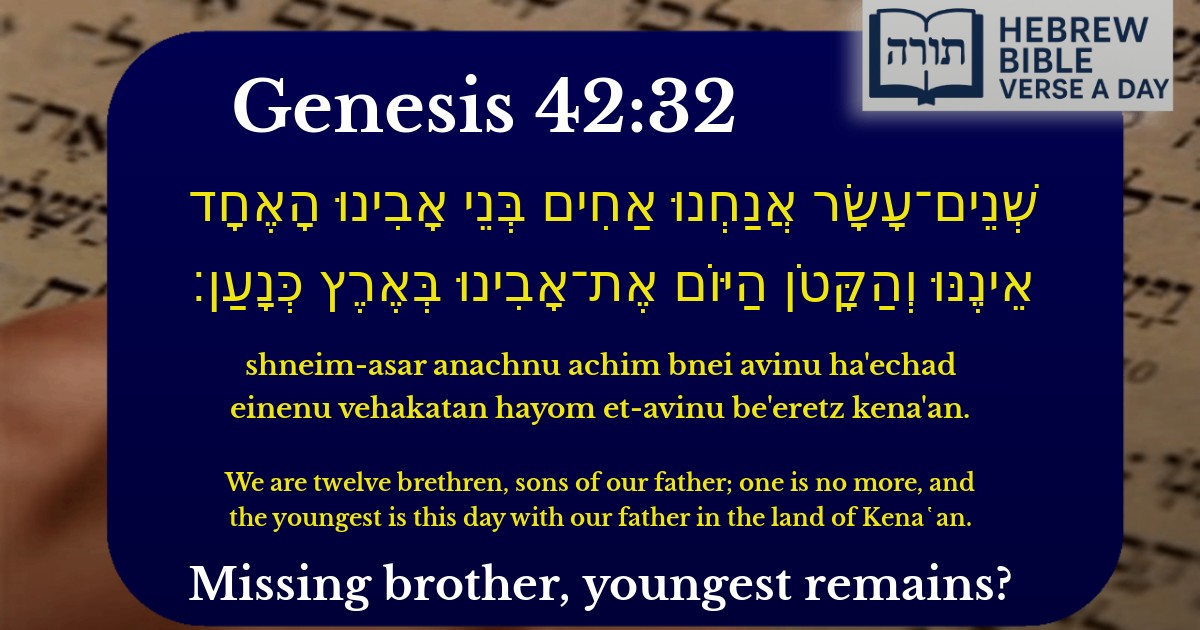Join Our Newsletter To Be Informed When New Videos Are Posted
Join the thousands of fellow Studends who rely on our videos to learn how to read the bible in Hebrew for free!
Hebrew Text
שְׁנֵים־עָשָׂר אֲנַחְנוּ אַחִים בְּנֵי אָבִינוּ הָאֶחָד אֵינֶנּוּ וְהַקָּטֹן הַיּוֹם אֶת־אָבִינוּ בְּאֶרֶץ כְּנָעַן׃
English Translation
We are twelve brethren, sons of our father; one is no more, and the youngest is this day with our father in the land of Kena῾an.
Transliteration
Shneim-asar anachnu achim bnei avinu ha'echad einenu vehakatan hayom et-avinu be'eretz kena'an.
Hebrew Leining Text
שְׁנֵים־עָשָׂ֥ר אֲנַ֛חְנוּ אַחִ֖ים בְּנֵ֣י אָבִ֑ינוּ הָאֶחָ֣ד אֵינֶ֔נּוּ וְהַקָּטֹ֥ן הַיּ֛וֹם אֶת־אָבִ֖ינוּ בְּאֶ֥רֶץ כְּנָֽעַן׃
שְׁנֵים־עָשָׂ֥ר אֲנַ֛חְנוּ אַחִ֖ים בְּנֵ֣י אָבִ֑ינוּ הָאֶחָ֣ד אֵינֶ֔נּוּ וְהַקָּטֹ֥ן הַיּ֛וֹם אֶת־אָבִ֖ינוּ בְּאֶ֥רֶץ כְּנָֽעַן׃
🎵 Listen to leining
Parasha Commentary
📚 Talmud Citations
This verse is quoted in the Talmud.
📖 Megillah 16b
The verse is referenced in the context of discussing the story of Joseph and his brothers, highlighting the theme of brotherhood and divine providence.
📖 Sanhedrin 102a
The verse is cited in a discussion about the brothers' statement to Joseph, examining the ethical and narrative implications of their words.


Context of the Verse
This verse (Bereshit 42:13) is spoken by Yosef's brothers when they stand before him in Egypt, unaware of his true identity. They present themselves as twelve brothers, with one missing (Yosef, whom they had sold into slavery) and the youngest (Binyamin) remaining with their father Yaakov in Canaan.
Rashi's Commentary
Rashi explains that the brothers' statement "one is no more" (הָאֶחָד אֵינֶנּוּ) is intentionally vague. They did not admit to selling Yosef, but rather implied he had perished, either through wild animals (as they had previously led Yaakov to believe) or some other means. This reflects their discomfort with their past actions and their attempt to conceal their guilt.
Midrashic Insights
Rambam's Perspective
In Moreh Nevuchim (3:36), Rambam discusses how this episode illustrates the concept of hashgacha pratit (Divine Providence). The brothers' actions led to Yosef's rise to power in Egypt, which ultimately saved their family during the famine—showing how Hashem guides events for the ultimate good.
Chassidic Interpretation
The Kedushat Levi (R' Levi Yitzchak of Berditchev) teaches that the brothers' statement reflects their spiritual state: they recognized their unity as twelve tribes ("twelve brethren"), but felt incomplete ("one is no more") due to their past sin. Their journey to Egypt symbolizes the soul's quest for teshuvah (repentance) and reconciliation.